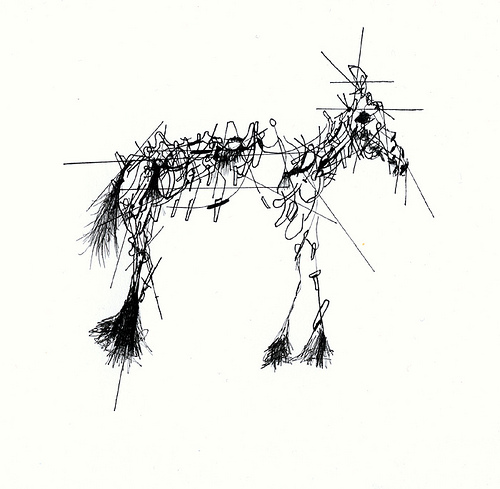
Your Super-Ego Is
Just an Old Nag

The books we read in adolescence often have an extraordinary effect on our lives. They are, among other things, an attempt at regime change. In Freud's language we could say that we free ourselves of our parents' ideals for us by using the available culture to make up our own ego-ideals, to evolve a sense of our own affinities beyond the family, to speak a language that is more our own. In the self-fashioning of adolescence, books (or music or films) begin really to take, to acquire a subtle but far-reaching effect that lasts throughout a person's life. We should, therefore, take seriously Freud's adolescent passion for Don Quixote, a story about a "madman" --- as he is frequently referred to in the book --- whose life is eventually entirely formed by his reading, in his case the reading of chivalric romances. He is a man who inhabits, lives in and through, the fictions about knights errant that he has consumed, a fictional character who makes himself out of fictional characters.As a young man Freud was an avid reader, and was very good at and interested in languages. He learned Spanish, as he wrote to a correspondent in 1923, for a particular reason: "When I was a young student the desire to read the immortal Don Quixote in the original of Cervantes led me to learn, untaught, the lovely Castilian tongue." This "youthful enthusiasm" was born of a passionate relationship with a schoolfriend called Edward Silberstein. He was, Ernest Jones writes in his biography of Freud,
Freud's bosom friend in school days, and they spent together every hour they were not in school. They learned Spanish together and developed their own mythology and private words, mostly derived from Cervantes . . . They constituted a learned society to which they gave the name of Academia Cartellane, and in connection with it wrote an immense quantity of belles-lettres composed in a humorous vein.
An intimacy between two boys that is based on a story about an intimacy between two men, an intimacy that inspires writing and humour and complicity: Don Quixote (not incidentally more or less a contemporary with Hamlet) could be linked in many ways with Freud's life and the development of psychoanalysis. But there is one thing worth singling out in this text for the purposes of thinking further about unforbidden pleasure, and the often futile unforbidden pleasure of self-criticism: Don Quixote's infamous horse, Rocinante. In a well-known passage in the New Introductory Lectures, where Freud is describing the relationship between the ego and the id --- between the person's conscious sense of themselves and their more unconscious desires --- he uses an all too familiar, traditional analogy (as if to say, psychoanalysis is just a modern version of a very old story). "The horse," Freud writes, "supplies the locomotive energy, while the rider has the privilege of deciding on the goal, and of guiding the powerful animal's movement. But only too often there arises between the ego and the id the not precisely ideal situation of the rider being obliged to guide the horse along the path by which it itself wants to go."
I take this "not precisely ideal situation" to be an allusion, whatever else it may be in our over-interpreting it, to Don Quixote; and to what, in several senses, he was led by. If we read it like this the ego is the deluded fantastical knight who, like all realists, is utterly plausible to himself. And Rocinante, in this rather more Beckettian version, is what we call an old nag: this is at once a parody of, and an exposé of, the horse as elemental force. And where does Rocinante go, as Don Quixote is led by his horse? He goes home. But because he is a horse, not a person, home does not mean incest --- it just means where he lives. Home had always meant more than incestuous desire; until it was under-interpreted by psychoanalysis. In this pre-Freudian/post-Freudian model --- one, perhaps, that Freud repressed in his urge to provide a more scientifically bracing and traditionally religious model --- the id is the nag Rocinante, the ego is the mad Don Quixote, and the super-ego is the sometimes amusing, often good-humoured, sometimes down to earth and gullible Sancho Panza. "Sancho," the critic A.J. Close writes, "is proverbially rustic; panza means belly; and the character of the man is basically that of the clowns of 16th-century comedy; lazy, greedy, cheeky, loquacious, cowardly, ignorant, and above all nitwitted." What does the Freudian super-ego look like if you take away its endemic cruelty, its unrelenting sadism? It looks like Sancho Panza. And like Sancho Panza, the absurd and obscene super-ego is a character we mustn't take too seriously.
"Sancho proves to have too much mother wit to be considered a perfect fool," Nabokov writes, "although he may be the perfect bore." We certainly need to think of our super-ego as a perfect bore, and as all too gullible in its apparent plausibility. We need, in other words, to realise that we may be looking at ourselves a little more from Sancho Panza's point of view, whether or not we are rather more like Don Quixote than we would wish. We may have underestimated just how restricted our restrictiveness makes us.
--- From "Against Self-Criticism"
Adam Phillips
©2015 LRB